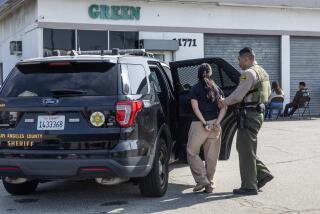Liquor Will Tip the Scales : Rebuilding: A market’s fate hinges on whether Compton will let it sell alcohol. The case pits merchants’ needs against residents’ desire to upgrade battered neighborhoods.
For the time being, an empty lot on Rosecrans Avenue in Compton is all that remains of Man Suk Sin’s dreams of life in the United States. The small liquor store and market she ran was looted and burned by rioters moments after she left for the day on April 30.
The future of Sin’s lot--now just a fenced-in slab of concrete with garbage piling up in the corners--depends on whether city officials grant her a permit to resume selling alcohol.
Tonight, as Sin goes before the Compton Planning Commission to ask for permission to rebuild her store, the owners of hundreds of burned-out markets will be watching, seeking a sign as to how their rebuilding applications might fare in their communities.
And when the panel votes on Sin’s application--the first such vote since the riots--it will have to balance the competing needs of liquor merchants trying to earn a living and the beleaguered residents of the communities they serve.
The riots have brought to a head the determination of community groups--in Los Angeles as well as in Compton--who have fought for nearly a decade to cut the number of liquor stores. Almost 400 of Los Angeles’ 2,887 liquor, beer and wine stores were damaged or destroyed, presenting what some consider an opportunity to eliminate blight and reduce crimes often associated with over-consumption of alcohol.
In Los Angeles, the City Council has approved a controversial ordinance that streamlines procedures for most businesses wishing to rebuild, but requires liquor stores to go through a protracted public hearing process that merchants say discriminates against them. Only one business has applied for rebuilding approval so far.
In nearby Compton, a largely African-American and Latino city of 90,000, one-third of the city’s 78 liquor, beer and wine outlets were shut down by the riots. And a cadre of community activists hopes to force the stores to abandon liquor sales when they reopen.
“I’d like to see neighborhood stores, family markets as opposed to liquor outlets,” said Eddie Mae Williams, director of the Compton Area Coalition Community Partnership. “We don’t want our children to grow up thinking that liquor stores are where you go to shop.”
That kind of campaign could spell disaster for hundreds of store owners who have sunk their life savings into the tiny corner markets and depend on the profits from liquor sales to stay in business.
Sin says that if she cannot sell alcohol along with groceries at her tiny B&M; Liquor, she is ruined financially. The liquor license that came with the store when she bought it in 1988 accounted for at least one-third of the $300,000 purchase price., the 41-year-old Korean-American said. “On bread and milk, we don’t make money,” because of low profit margins. “On liquor, beer and wine, we get 25%.”
The store was a place where she spent 16-hour workdays--a life very different from the glamorous time she envisioned when she left South Korea in 1970. “I thought I would live like a queen,” Sin said. Instead, she became a cashier and worked in a factory.
Sin is married to a retired welder, lives in Walnut and has a 6-year-old son. The family saved for years to buy their own business, she said, forgoing vacations and luxuries.
To sell alcohol when she rebuilds, Sin will have to obtain a city permit--a requirement that may run counter to state law, according to Manny Espinoza, deputy director of the state’s Alcoholic Beverage Control Department. Store owners with liquor licenses have a “vested right to rebuild at the same site without the need for any application to this department nor from a city or county,” he said.
The ABC will be closely monitoring cases in Los Angeles, Compton and elsewhere, Espinoza added. “We expect some lawsuits over this” by merchants, he said.
Compton City Atty. Wesley Fenderson said city officials cannot publicly discuss the Sin case until the commission votes. But he believes the city has “zoning restrictions we can impose.”
Compton’s conditional-use permits for alcohol sales must conform to the city’s alcoholic beverage sales policy, which flatly states that liquor stores are “not encouraged.” Stores that exist, according to the policy, should be at least 1,000 feet from one another and from facilities such as schools.
Sin’s store does not meet those requirements: It is next door to a park, 650 feet from an elementary school and less than 100 feet from a convenience store that also sold beer and wine before it was destroyed in the riots.
The city’s planning department has recommended that the Planning Commission deny Sin’s application, or impose several conditions, such as employment of a nighttime security guard, if the permit is approved. Sin said she works 16 hours daily because she cannot afford to hire help and could not absorb the cost of a guard.
It is ironic that Sin, who is well liked in her neighborhood, finds herself pioneering to protect a type of business that has become unpopular.
Although some Korean-American merchants have been criticized for rudeness, Sin was able to collect signatures from more than 300 local residents supporting her return. At a hearing on her case earlier this month, one man told the commission that he was on welfare, with seven children, and Sin extended credit to his family. Bridget Johnson, a mother of four, said Sin knew all her sons by name.
The commissioners’ comments reflected the dilemma.
“If we say (store owners) cannot do the things they were doing before, they are really double victims, aren’t they?” Commissioner Ellis Cooke asked.
“I agree the applicant has suffered, but I also realize there are a lot of victims in the community due to the amount of alcohol that has been sold,” Commissioner Kenneth Perkins said.
To Commission Chairman James Davis, Sin seems like “the type of person we need to have in the community.” But he said, “I disagree with the premise (that) in order for this business to be successful it must sell alcohol.”
But liquor provides the lion’s share of the profits for such stores, according to Jon Goodman, a specialist in small businesses who heads the USC Entrepreneur Program. Compared to regular groceries, she said, “liquor is real high-margin. To profit from bread, milk, cat food, sugar, that stuff, you’ve got to do enormous volume because it’s low-margin.”
Because small markets cannot sell groceries in huge quantities, as a supermarket can, “it’s a bad business bet” if the small market cannot sell liquor, Goodman added. Sin recently learned that the federal Small Business Administration has approved a low-interest, 20-year loan of $211,000 to rebuild her store. Her insurance will cover the balance of her existing $200,000 bank loan, removing financial obstacles to reopening.
The only remaining question is whether she will be allowed to sell alcohol--and the answer to that will determine whether she returns. Meanwhile, she has not taken advantage of any of her newly found free time. All she thinks about is working, she said, “waiting to rebuild. Waiting and waiting.”
More to Read
Sign up for Essential California
The most important California stories and recommendations in your inbox every morning.
You may occasionally receive promotional content from the Los Angeles Times.










